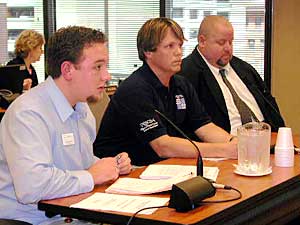|
Audio
Photos
More from MPR
Resources
Your Voice
|
MnSCU students face higher tuition
July 17, 2003
Leaders of the Minnesota State Colleges and Universities System voted Wednesday to sharply increase tuition over the next two years. Students will pay an average of $400 a year more to attend one of MnSCU's 33 institutions. Officials say state budget cuts to higher education forced the increases. Many students are disappointed. They also say the board's decision to set increases two years in advance will price many students out of an education.
St. Paul, Minn. — For the first time since MnSCU was formed almost a decade ago, the institution set tuition and fee rates for two academic years, 2004 and 2005.
Chancellor James McCormick says it's a practical move to coincide with the biennial legislative sessions.
"The budget is passed for a two-year period, and we have collective bargaining agreements that are two years," says McCormick. "It seems to me that for not only student planning and parent planning, but also for presidential planning on how we deliver services, if we can think of it in years, it makes a lot more sense to us to be able to do that."
The Board of Trustees approved the increases on an 8-4 vote.
|
I would wish that they could spend more time in the classroom. But in order to finance their way, they are working to put themselves through school. And that's our kind of institution.
- Roy Saigo, president of St. Cloud State University |
As soon as this summer, some MnSCU students will see tuition and fees increase 18 percent, but the average increase is about 12.5 percent. The 2005 average increase is also about 12.5 percent.
The technical and community colleges in the system opposed the two-year plan.
Student representative Jeff Thompson says setting tuition in advance could remove any incentive for the MnSCU institutions to take student concerns into consideration.
"I am concerned -- what is consultation by definition now? Is it them telling you what it is, or are we going to be involved in the negotiation of the process?" Thompson asks. "Did this just eliminate our ability next year to negotiate with the administration?"
Chancellor McCormick responds that the institution will seek student input regarding the second year increase amounts before the 2005 school year.
Meanwhile, students are already worrying about what they're going to do.
Lisa Fontecha is a mathematics student at Inver Hills Community College. Her goal is to eventually transfer to the University of Minnesota for a teaching credential. She says the extra $800 she'll have to find to finish her community college studies over the next two years will put her deeper in debt.
"I'm a single mother, and I do work full time. Trying to find time to be a good mother, and find time to pay the bills and find time to be a good student -- which is very important to me -- I always take the maximum amount in loans to cover my tuition. And as a public school teacher in four years, I'm not sure how I'm going to pay them back," says Fontecha.
Student representatives of both the two-year and four-year MnSCU institutions say the tuition hikes threaten students' ability to graduate on time and receive a quality education.
Tuition at St. Cloud State University is set to increase 15 percent both years. President Roy Saigo says one of the disturbing realities of the current situation is that students may have to work more and study less.
"I would wish that they could spend more time in the classroom. But in order to finance their way, they are working to put themselves through school. And that's our kind of institution." Saigo says.
Presidents at each of MnSCU's 33 institutions will decide if the increases will start with the summer or fall 2003 semesters.
Student representatives say they understand the current economic crisis in the state is precipitating the increases. But they say they hope lawmakers will be more generous to public higher education when the state's budget picture improves.
|
News Headlines
|
Related Subjects
|

